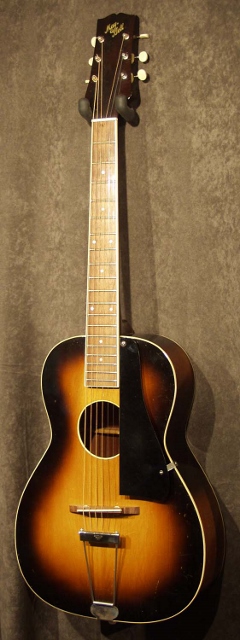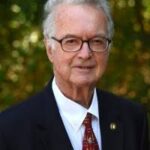My mother always wanted me to learn to play the guitar. It stands out in my mind from time to time as an early, recurring, and significant memory. It puzzles me.
There were no musicians in my family. Like most of our neighbors, we were on public welfare during the depression years and there was no money for music lessons, but my mother gave them a high priority and I faced them every week.
She loved country music, country singing, and especially the banjo and guitar. Occasionally, she mentioned an acquaintance named ‘Army Turner’ whom she had once admired. “His hair was dark, thick, and wavy,” she would say, “and he could cast a spell when he sang and played the guitar.” It was his talents she so desperately desired for me. She even tried to curl my hair with soap and water,

I do not remember the age when I first started taking guitar lessons, but the guitar, a gem that my mother purchased from a pawnshop, with “Buddy” painted on a nameplate, was considerably taller than I was. I took the streetcar downtown in Norfolk, lugging along my guitar to music lessons at the Levy Page Temple of Music on City Hall Avenue. During World War II the streetcars were filled with sailors who managed to get me to “play” for them. I had learned a few songs pretty well, but basically, I was a poor musician: I had no sense of timing.
I do not recall what precipitated it, but finally I made up my mind to quit my guitar lessons. It was not an adolescent rebellion. I was barely twelve years old but I simply could no longer go through the motions while pretending to pay attention to my music teachers who by then, I sensed, were equally disinterested despite prompt payment of their fees.
Changing teachers did not help. I simply could not learn to play the guitar. In short, I was intimidated by it.
My mother was a very strong-willed person. I cannot recall another time in my life when I stood up to her. “Not this day, Our Father” was a pronouncement she often used to decline a request from me for some favor or activity. I knew that a second request would be fruitless, might provoke a storm of antagonism, and she would remain disobliging as well.
She definitely loved me and I wanted to please her, but I definitively defied her when it came to continuing my music lessons.
It was a terribly upsetting endless moment in time. She cried, screamed and shrieked in a shattering, loud, piercing high-pitched voice. Without a doubt, she was heartbroken. “You will never forget this day!” she correctly predicted.
We were in the kitchen on 39th Street. The windows were open on that clear summer day. My father was there but as usual he said very little. “Lou don’t be so hard on him,” he uttered meekly. My older sister, Edith, was in an adjoining room. Later she may have tried to comfort me, but I do not remember feeling consoled. My mother did not speak to me for hours afterwards which as I recall now was her practice after punishing me for my transgressions. It was the silent treatment that hurt me the most.
So my music lessons did indeed end that day. My mother lived for another 39 years but my music lessons were never mentioned again.
Nothing surpasses the sadness I felt when I entered the funeral home and saw her body in a casket. In the hospital, a few days earlier, she had received the formal announcement of the opening of my medical practice in Charlottesville, amazingly, only a few hours after it was mailed from Charlottesville to Norfolk. She died, therefore, knowing that her prayers over my calling to be a physician had been answered.
It has been five decades since my mother’s death. The old guitar is gone. I cannot remember what actually happened to it though its deep tones of brown and yellowing gold, its pearl frets, and its pleasing acoustical melodic sounds are as clear to me, visually and audibly, as if the guitar were in my lap at this moment.
My mother had none of the advantages of a formal education, but she had a very keen mind. I wonder if this is how she would counsel me now if she were here. I remember her counsel to a family member who was upset over buying a house: “It’s just real estate.” In other words, keep things in the right perspective. Living the dream of another can become a nightmare. Everyone needs to live his or her own dream.
For my 85th birthday, our son Clinton, an accomplished musician, gave me a guitar. He borrowed a photograph of me when I was 11 years old, playing my Slingerland guitar. Consulting online with fellow guitarists, he traced my instrument back to a 1937 model and found an exact and authentic Slingerland guitar, the very instrument that I had so miserably never learned to play.
“Cut your fingernails, Dad, just like mine. The more you practice, the sooner you will develop callouses just as I have. Here are two basic guitar lesson books. I will help you learn to play the guitar . . .”
So yes, my mother wanted me to sing and play the guitar. Perhaps I will one day finally learn to play this one as well – amongst a few other things.

Robert S. Brown, MD, PHD a retired Psychiatrist, Col (Ret) U.S. Army Medical Corps devoted the last decade of his career to treating soldiers at Fort Lee redeploying from combat. He was a Clinical Professor of Psychiatry and Professor of Education at UVA. His renowned Mental Health course taught the value of exercise for a sound mind.

